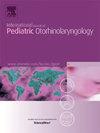更昔洛韦对先天性巨细胞病毒感染患儿听力的影响
IF 1.3
4区 医学
Q3 OTORHINOLARYNGOLOGY
International journal of pediatric otorhinolaryngology
Pub Date : 2025-07-16
DOI:10.1016/j.ijporl.2025.112491
引用次数: 0
摘要
目的评价更昔洛韦对长期听力预后的影响。方法:这项匹配队列研究提供了16年来收集的佛兰德CMV登记处(比利时)的多中心数据。接受至少4年听力学随访的治疗和未治疗的ccpv感染儿童被纳入研究。主要结果是听力进化。在治疗组和未治疗组之间对自发性听力进化的危险因素进行精确匹配。采用混合回归模型计算平均边际处理效果。结果525例患儿中,98例(18.7%)得到治疗。抗病毒治疗并未显著改善听力(RR,1.56;95% CI,0.48 ~ 4.93)或更少的听力退化(RR,0.89;95% CI,0.61 - 1.25)。与未治疗的儿童相比,用缬更昔洛韦治疗单侧先天性听力损失儿童6周可预防对侧晚发性听力损失(RR,2.49∗10−8;95% CI,9.19 * 10−9 ~ 7.71 * 10−8)。同样,在双侧听力正常的有症状儿童中,更昔洛韦治疗6周也可以预防晚发性听力损失(RR,3.65∗10−7;95% CI,2.16 * 10−7 ~ 6.21 * 10−7)。从6周延长到6个月对听力改善没有任何有益的影响(RR,4.61∗10−8;95% CI,1.07∗10−8 ~ 2.32∗10−7),听力下降(RR,1.21;95% CI,0.43 - 2.25)或晚发性听力损失(RR,1.95;95% CI,0.63 - 5.93)。结论(Val)更昔洛韦治疗6周可预防晚发性听力损失。六个月的治疗没有发现额外的益处。这些新发现有助于治疗决策。未来的研究需要更大的样本量,并调查缬更昔洛韦对长期神经预后的影响。本文章由计算机程序翻译,如有差异,请以英文原文为准。
The effect of (val)ganciclovir on hearing in children with congenital cytomegalovirus infection
Objectives
To assess the effect of (val)ganciclovir on long-term hearing outcome.
Methods
This matched cohort study presents multicentric data of the Flemish CMV registry (Belgium) collected over 16 years. Treated and untreated cCMV-infected children with a minimal four-year audiological follow-up were included. Primary outcome was hearing evolution. Exact matching for risk factors of spontaneous hearing evolution was performed between the treated and untreated group. The average marginal treatment effect was calculated using a pooled regression model.
Results
Of the 525 children, 98 (18.7 %) were treated. Antiviral therapy did not significantly result in more hearing improvement (RR,1.56; 95 % CI,0.48 to 4.93) or less hearing deterioration (RR,0.89; 95 % CI,0.61 to 1.25). Treatment of children with unilateral congenital hearing loss with valganciclovir for six weeks prevented contralateral late-onset hearing loss compared to untreated children (RR,2.49∗10−8; 95 % CI,9.19∗10−9 to 7.71∗10−8). Similarly, late-onset hearing loss could be prevented in symptomatic children with bilateral normal hearing treated with ganciclovir for six weeks (RR,3.65∗10−7; 95 % CI,2.16∗10−7 to 6.21∗10−7). Prolongation from six weeks to six months showed no beneficial effect on hearing improvement (RR,4.61∗10−8; 95 % CI,1.07∗10−8 to 2.32∗10−7), hearing deterioration (RR,1.21; 95 % CI,0.43 to 2.25), or late-onset hearing loss (RR,1.95; 95 % CI,0.63 to 5.93).
Conclusions
(Val)ganciclovir for six weeks prevented late-onset hearing loss. No additional benefit of a six-month therapy was found. These novel findings can aid in treatment decision making. Future studies with a larger sample size and investigation on the effect of valganciclovir on long-term neurological outcome are needed.
求助全文
通过发布文献求助,成功后即可免费获取论文全文。
去求助
来源期刊
CiteScore
3.20
自引率
6.70%
发文量
276
审稿时长
62 days
期刊介绍:
The purpose of the International Journal of Pediatric Otorhinolaryngology is to concentrate and disseminate information concerning prevention, cure and care of otorhinolaryngological disorders in infants and children due to developmental, degenerative, infectious, neoplastic, traumatic, social, psychiatric and economic causes. The Journal provides a medium for clinical and basic contributions in all of the areas of pediatric otorhinolaryngology. This includes medical and surgical otology, bronchoesophagology, laryngology, rhinology, diseases of the head and neck, and disorders of communication, including voice, speech and language disorders.

 求助内容:
求助内容: 应助结果提醒方式:
应助结果提醒方式:


